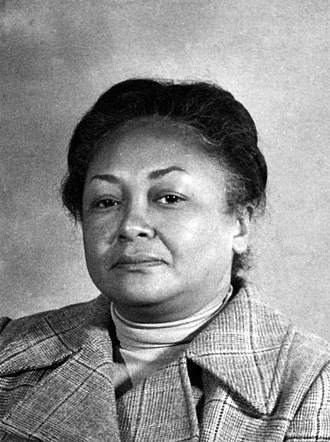Gisèle Rabesahala, a political and human rights activist and councilwoman, was born Marie Gisèle Aimée Rabesahala on May 7, 1929, in Antananarivo, Madagascar, which had been a French colonial possession since 1896. Her father was a non-commissioned French army officer, and Rabesahala spent her childhood in France, Tunisia, and what is now Mali. She graduated from Jean Joseph Rabearivelo High School in Antananarivo in 1945 and earned her Preparatory Certificate. She then trained as a Stenographer typist in 1946 and entered politics when she was 17.
Rabesahala soon afterward was employed as secretary to the Democratic Movement for Malagasy Renewal (MDRM), which campaigned for the country’s independence and on behalf of political prisoners. She helped free thousands of prisoners following the Malagasy Uprising in 1947 through her articles, bringing attention to their cause and plight.
In 1956, Rabesahala became the first woman elected as a municipal councilor. In 1958, she was a political party leader where she united several competing nationalist organizations, including the Protestant Merina dissidents and communists, to help create the Congress Party for the Independence of Madagascar (Antokon’ny Kongresin’ny Fahaleovantenan’i Madagasikara; AKFM) which she co-founded in 1960. Her work during this period helped break barriers that prevented women from gaining access to leadership.
After the AKFM took power in 1975, it established the socialist-Marxist Democratic Republic of Madagascar, and Rabesahala was appointed Minister of Culture and Revolutionary Art of Madagascar. She was the first woman to hold a ministerial position in the Madagascar government, serving in that post from 1977 to 1991.
During her tenure in office, Rabesahala promoted the language, culture, and heritage of the Malagasy people. She created the Malagasy Copyright Office and spearheaded the restoration of historical sites and monuments such as royal palaces and tombs. In addition, she founded the National Library, creating branches of public libraries in 58 towns, and ensured that many books in the library were written in Malagasy by Malagasy authors. Throughout her career, she advocated for the poor and underserved.
From 2001 to 2003, Rabesahala was the Deputy Speaker of the Senate. She also held membership in numerous organizations, including serving as Founder of the Madagascar-Cuba Friendship Association, Grand Officer of the Malagasy National Order, Medalist of the Order of Friendship of the Peoples of the Former USSR, Medalist of the Order of Friendship of the Peoples of Vietnam, the Joliot Curie Gold Peace Medal of the World Peace Council, and the Order of Anna Betancourt Award that is presented to women including foreigners in recognition of excellent merits and extraordinary creative work in the defense of the revolutionary ideals, the anti-imperialist fight, and the liberation and independence of the towns.
Gisèle Rabesahala, whose activism during the struggle for independence paved the way for other female African political leaders, died on June 27, 2011. She was 82.

